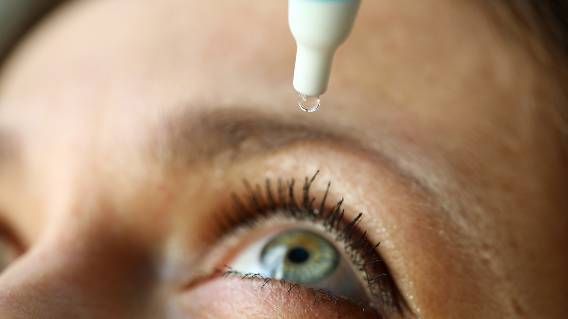
Manufacturers recently recalled four different brands of eye products, including Ezricare and Delsam, due to severe contamination risks that could cause blindness, injury or even death.
Recalled eye drops include:
- Apotex Brimonidine Tartrate Ophthalmic Solution, 0.15%
- Delsam Pharma’s Artificial Eye Ointment
- EzriCare Artificial Tears Lubricant Eye Drops
- Purely Soothing 15% MSM Drops
Consumers should immediately stop using the products and contact a health care provider at any sign of infection, the U.S. Food and Drug Administration warned.
Nonsterility issues, which could result in contamination and then infection, have been linked to all four products, according to the FDA.
The Centers for Disease Control and Prevention reports at least one person has died and another lost an eye. Several others suffered permanent vision loss after developing an infection linked to the EzriCare Artificial Tears Lubricant Eye Drop recall, the agency reported.
“We are actively gathering more information about long-term patient outcomes, particularly for patients with eye infections,” a CDC spokesperson told CBS news last month.
Imported Eye Drops Linked to Drug-Resistant Bacteria
In early February, officials issued a health alert after the discovery of the rare and drug-resistant bacteria.
“The outbreak strain, carbapenem-resistant Pseudomonas aeruginosa with Verona integron-mediated metallo-β-lactamase and Guiana extended-spectrum-β-lactamase (VIM-GES-CRPA), had never been reported in the United States prior to this outbreak,” the CDC reports.
The agency has since located at least 64 patients in 13 states linked to the outbreak.
Several ill patients reported using EzriCare Artificial Tears prior to infection. Lab testing found the harmful bacteria in patients’ opened, multiuse medicine bottles in two states.
CDC officials continue testing the products to determine if the contamination occurred during manufacturing.
Global Pharma Healthcare, an India-based company, manufactures EzriCare and Delsam Pharma eye drops.
The FDA has put pressure on the company for poor manufacturing practices and banned the importation of products into the U.S., officials said.
Violations include:
- Formulation issues
- Inappropriate microbial testing
- Lack of proper controls for tamper-evident packaging
Apotex Corp., which is based in Canada, also recalled six lots of its Brimonidine Tartrate Ophthalmic Solution, 0.15%. Some bottle caps developed cracks that may affect the product’s sterility. Company officials recalled the bottles “out of an abundance of caution,” according to the FDA’s March 2 notice.
Pharmedica USA manufactures the Purely Soothing brand in Arizona. Those drops are also being recalled due to sterility issues that “could result in blindless.”
The over-the-counter drops, sold online and at trade shows, are used to treat eye irritation and swelling. Pharmedica USA said consumers should not use the drops and return them to the place of purchase.
Wholesalers and retailers were asked to pull the product from shelving and return the product to Pharmedica or dispose it with proper verification.
All four recalls were voluntary.
Consumers Should Stop Using Ezricare, Delsam Eye Drops
Consumers are urged to stop using the eye drops immediately and contact a health care provider if there are any signs of infection including:
- Blurry vision
- Eye pain or discomfort
- Feeling of something in your eye (foreign body sensation)
- Increased sensitivity to light
- Redness of the eye or eyelid
- Yellow, green, or clear discharge from the eye
Health care providers are encouraged to report any issued related to this medication to the FDA’s MedWatch Adverse Event Reporting Program. Consumers can also contact the FDA’s Consumer Complaint Coordinators.
Consumer who used contaminated EzriCare Artificial Tears and were injured as a direct result have begun filing lawsuits. Plaintiffs are seeking refunds for the purchase price of the product in class-action lawsuits and plaintiffs in individual EzriCare personal injury lawsuits are seeking compensation for infections and eye problems.